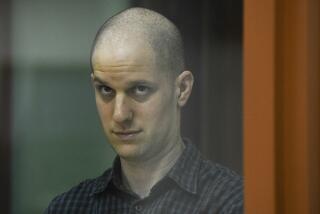Exiled oligarch calls for ‘force’ to effect change in Russia
MOSCOW — Exiled tycoon Boris Berezovsky, a onetime Kremlin power broker-turned-fierce critic of Russian President Vladimir V. Putin, in remarks published Friday called for the use of “force” to change Russia’s government.
The Russian prosecutor general’s office responded by opening a criminal investigation over Berezovsky’s comments to a British newspaper, declaring in a statement on its website that “a call for the violent overthrow of a government is a crime in all civilized countries.”
The prosecutor’s office also urged Britain to revoke the billionaire’s political asylum and extradite him to Russia, where he would face fraud charges related to the 1990s business dealings that made him wealthy. Berezovsky says those charges are politically motivated.
In audio of an interview fragment posted on the Guardian newspaper’s website, Berezovsky says advocates of democracy in Russia “need to use force to change this regime” because Putin has created an “anti-constitutional” government.
“It means that I hope to use force to re-create a constitutional regime again,” he explains. “It means that I am for the constitution, and Putin is against the constitution.”
In the article, Berezovsky is quoted as saying, “It isn’t possible to change this regime through democratic means. There can be no change without force, pressure.”
Berezovsky later issued a statement saying he was not advocating the violent overthrow of the Russian government. He cited peaceful uprisings in Ukraine and Georgia in recent years as “good examples” of how change might come.
Russian authorities reacted quickly to the interview in apparent hope that it might help them reach their long-sought goal of extraditing Berezovsky.
Sergei Mironov, speaker of the upper house of parliament, said on television that “prison is crying out for such a man.”
“His statement is a call to overthrow the current authorities in a violent way. He doesn’t conceal it,” Mironov said. “This is a crime punishable by law.”
Russian Foreign Minister Sergei V. Lavrov said in televised remarks that Moscow had repeatedly asked British authorities “to stop the situation in which Boris Berezovsky is taking advantage of political refugee status and blatantly abuses this status, and commits actions which according to British law require his extradition.”
In additional televised remarks, Putin spokesman Dmitry Peskov said, “We value relations of cooperation and partnership with Great Britain and certainly count on London preventing threats against Russia coming from its territory.”
In his published comments, Berezovsky implied that he was helping finance members of Russia’s “political elite” who disagreed with Putin. The article described these people as individuals “close to the president who are conspiring to mount a palace coup.”
“If one part of the political elite disagrees with another part of the political elite -- that is the only way in Russia to change the regime,” Berezovsky said.
The article quoted him as offering his “experience and ideology” and “understanding of how it could be done” to members of the political elite, then adding, “There are also practical steps which I am doing now, and mostly it is financial.”
Yury Fedotov, the Russian ambassador to London, told the BBC that Berezovsky’s remarks were not only “an open provocation and a challenge to the government of Russia” but also “a challenge to the British government.”
Scotland Yard issued a statement that it was “assessing the contents” of the Guardian article to see whether “any offenses” may have been committed.
The British Foreign Office also issued a statement. “We deplore any call for the violent overthrow of a sovereign state,” it said. “We expect everyone living or working in, or visiting the UK, whatever their status, to obey our laws. We will look carefully at this and any future statements by Mr. Berezovsky in that light.”
Holley reported from Moscow and Stobart from London.
More to Read
Sign up for Essential California
The most important California stories and recommendations in your inbox every morning.
You may occasionally receive promotional content from the Los Angeles Times.










